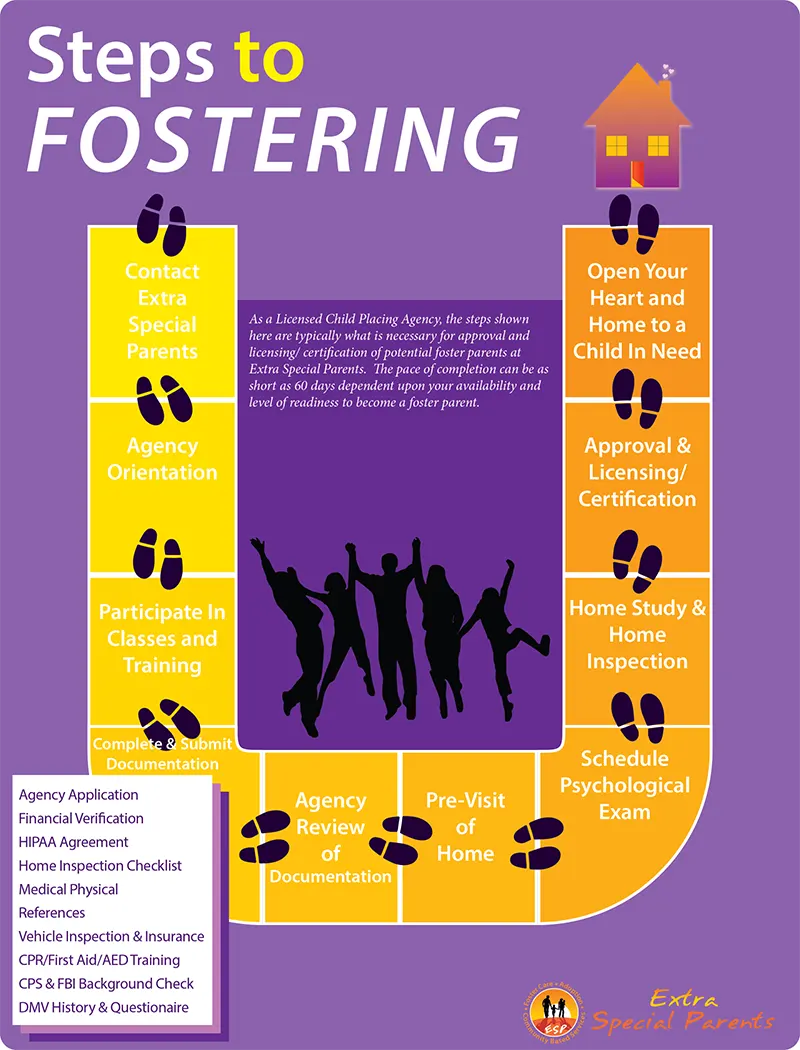If You Are Considering Adopting a Foster Child, We Can Help.
Simply submit the form below, and an Extra Special Parent advocate will get back to you. We are here to provide information and answer questions. If you decide a foster-to-adoption journey is right for you and your family, we can provide partnership and support resources to guide you every step of the way.
To adopt a foster child, Virginia requires you to first become a licensed foster parent. There is no cost; however, there are eligibility requirements. You must:
1) Reside in Virginia
2) Be at least 21 years old
3) Have financial stability
4) Provide adequate space for a child
5) Clear a criminal and background check, along with any adults living in the home
6) Attend all online foster parent training hours
7) Participate in an agency-conducted Home Study that meets safety and licensing standards
I'm ready to adopt a child, but where do I start?
The adoption process may seem overwhelming, but ESP specialists are here to guide you every step of the way. We'll help you identify needs and preferences, get state approval to adopt a foster child, and meet your child – or children – who will complete your family.

What are My Options to Adopt a Child from Foster Care?

What are My Options to Adopt a Child from Foster Care?
You must provide written permission to care for a foster child. This applies whether you are caring for the child temporarily or as part of the pre-adoption process. Every child is unique and has their own background and set of needs. You, and sometimes your foster child, will make the decision about whether the match is a forever fit.
Each child has a care team that looks out for them and their foster family, making sure they have what they need. Your case manager and local Department of Social Services (DSS) are your primary go-tos. They'll answer questions and provide child and family resources for your success.
The foster care system needs good parents who can provide stability and love to foster children. Finding the right fit is important, especially for foster-to-adopt parents who want to ensure their child will thrive in their family.
Foster children and parents have their own needs. Even when you foster a child for a short time, you are making a significant impact on their life. The impact of a permanent, nurturing home is even more profound.
Foster children all come into care having experienced the trauma of neglect, loss, or abuse. However, foster care is not a place for a child to grow up. Our goal is always to ensure children find safe, loving, and stable permanent homes.
You may be a prospective foster parent because you're interested in adoption. Five types of foster and adoptive parents each play a critical role in caring for foster children.
- Traditional Foster Care — Temporary care provided in a safe and loving foster home after Child Protective Services (CPS) identifies unsafe environments. Foster families are certified by a Licensed Child Placing Agency (LCPA), such as Extra Special Parents (ESP), or through the local Social Services Department.
- Treatment Foster Care — Temporary or extended care for foster children who have experienced intense trauma or who are medically fragile. These foster caregivers receive special training and certification through a Licenced Child Placing Agency (LCPA), such as ESP. Families also receive case management and crisis support for their children throughout their time away from birth families in family or group homes.
- Respite Care/Short-term Foster Care — An important part of self-care and rest, foster parents receive short-term relief for up to 29 days. During this period, they can address other priorities or simply rest and recharge. Respite care ensures that children in foster care are receiving excellent care from another trained and certified foster family even while their primary foster parents are away.
- Long-term Foster Care — Care longer than 30 days in the child welfare system is considered to be long-term care. Every foster child's case is different and often evolving based on biological parent behaviors and court conditions for return or adoption. Social workers sometimes need time to find a safe and nurturing home.
Options for permanency include placement with a relative, known as Kinship care. In many cases, birth parents need more time to meet court requirements and are motivated to regain custody of their children and youth in foster care.
In other cases, parents are lost, children are abandoned, or parents fail to meet court requirements. In some cases, courts may end parental rights, allowing foster parents to adopt and care for children as their own.
- Foster to Adopt: Often, adults commit to the foster care process with the goal of adopting a foster child or youth. During this time, the Termination of Parental Rights (TPR) is established. After six months of foster care, the TPR allows courts to finalize your adoption.
Top FAQs - Frequently Asked Questions
About Fostering to Adopt in Virginia
Our AdoptionVA team helps families looking to adopt foster children by providing information, education, and support resources. We seek first to understand your goals for foster care and adoption, your lifestyle needs, and your preferences. Your advocate and support team will help you understand different foster care programs and identify appropriate adoption agency options.
Your advocate will walk you through any special training you may need based on your goals. They will ensure your family's needs and lifestyle match those of your foster child. Your care team's goal is the same as yours: to identify a child who will thrive in your loving care.
We work under your timing and guidance if and when you are ready. Becoming a parent or an adoptive family is a profound and life-changing decision for you and your children. We are here to educate you and help you make an informed decision about whether this journey is the right one for you.

I'm Ready to Learn More About How to Adopt a Foster Child
There are no unwanted children, just unfound foster care families.
In Virginia, the process for applying and getting approved is the same whether you want to foster or adopt a child. Start the process by filling out online forms, including a foster parent application. You can fill out paperwork at your own speed by using a personal portal through your foster care agency partner.
You'll have a dedicated specialist to guide you every step of this rewarding journey. This includes providing information, resources, and reminders as you complete paperwork and required training hours. Topics include parenting strategies, trauma-informed care, and how to recognize and prevent child abuse and neglect.
The most detailed part of the foster-to-adopt process is the Home Study. Becoming a foster parent and being an adoptive parent requires work. With proper support, you and your foster children will never feel alone and will have 24/7 support all along the way.
You have the opportunity to change a child's life. Follow the steps below.
Your child is waiting
Call us anytime: 866-782-9474. An AdoptionVA Parent Advocate is here to answer your questions and get you scheduled for training if you are ready.
Get Started: How to Become a Forever Family
- 1. Be Bold - Make the call.
Reach out to us at 866-782-9474. A foster parent advocate will listen to your goals and answer your questions. If you're ready, we'll send you a welcome packet or schedule a free, no-obligation orientation so you can learn more. You can also request a phone call. - 2. Attend Orientation
We invite you and your family members to attend orientation. You have no cost or obligation to continue. You'll learn more about foster care and the adoption process and meet others considering a similar path. Orientation and training are both offered via Zoom. - 3. Complete Online Training
Completing five foster care training sessions satisfies state requirements. Training will equip you with all you need to become approved as an adoptive family. Sessions cover foster care rules, managing anger and grief, and identifying ing child abuse. You'll also learn parenting strategies and appropriate behavioral interventions for foster youth. - 4. Submit an Application
Your case manager will walk you through the paperwork required by Virginia for all foster and adoptive parents. Personal references, a physical exam and health screening, DMV records, and a financial assessment are among the essential submissions.Virginia DSS requirements can be overwhelming at first. We are here to help you every step of the way. We keep the process streamlined, and you focused on one step at a time.
- 5. Finish the Home Study
The most detailed and personal portion of the process is the Home Study, which includes at least three 2-hour home visits by a specialist. We will check your home for safety specs to see if any changes are necessary before you care for a child. During family interviews, you can share your needs and preferences while your specialist learns more about your family. This understanding will help match with a foster child who will thrive as part of your family.
- 6. Finalize Assessment
After you apply to foster-to-adopt and complete training, the Home Study, and background checks, a specialist will finalize your assessment. They will confirm if your family is ready to foster and adopt a child and see if you need any extra training or support. - On average, the approval process takes 120 days to complete before you can welcome a child into your home.
- 7. Celebrate!
Once you follow these steps and achieve your goal, we'll celebrate! You can do it...you can make a difference for a child as a Licensed Foster-to-Adopt Parent.
- Call Us Today!
We are grateful for all who step up and foster to adopt kids who have known tough circumstances and painful experiences. Your forever family will be just the soft landing your child needs to belong and grow with a family to count on.

Your Journey: Fostering to Forever Family

